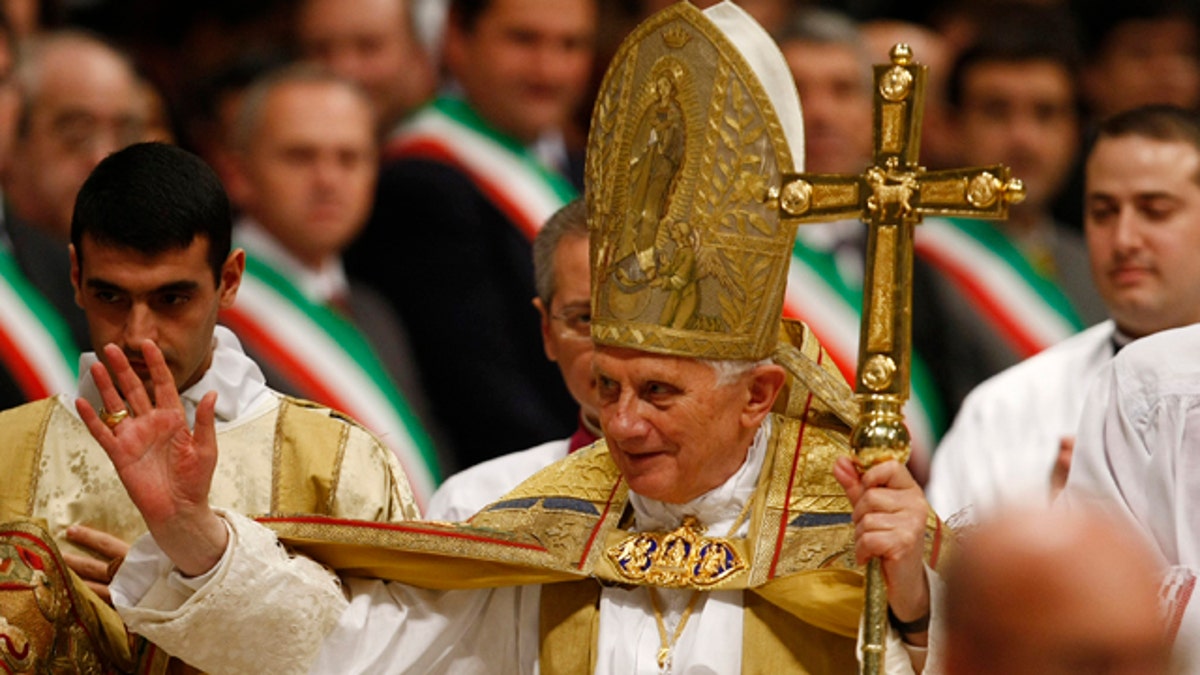
Nov. 20: Pope Benedict XVI blesses the faithful during a consistory inside St. Peter's Basilica, at the Vatican. (AP)
VATICAN CITY -- Pope Benedict XVI says in a new book that the use of condoms can be justified in some cases, such as for male prostitutes seeking to prevent the spread of HIV.
The pontiff makes the comments in a book-length interview with a German journalist, "Light of the World: The Pope, the Church and the Signs of the Times." The Vatican newspaper ran excerpts of the book Saturday.
Church teaching has long opposed condoms since they're a form of artificial contraception. The Vatican has been harshly criticized for its position given the AIDS crisis.
Benedict said that for male prostitutes -- for whom contraception isn't a central issue -- condoms are not a moral solution. But he said they could be justified "in the intention of reducing the risk of infection."
Benedict drew unprecedented criticism from European governments, international organizations and scientists in March 2009 when he told reporters while flying to Africa that condoms would not resolve the AIDS problem there but, on the contrary, increase it. The statement was condemned by France, Germany and the U.N. agency charged with fighting AIDS as irresponsible and dangerous.
While opposition to condoms is a long-standing church position, the Vatican felt constrained to step in and say Benedict wanted to stress that a reliance on condoms distracted from the need for proper education in sexual conduct.
Christian Weisner, of the pro-reform group We Are Church in the pope's native Germany, said it was "surprising, and if that's the case one can be happy about the pope's ability to learn."
The pope also says in the new book that if a pope is physically, psychologically or spiritually incapable of doing his job, then he has the "right, and under some circumstances, also an obligation to resign."
A man of deep personal faith, the former Cardinal Joseph Ratzinger has alienated some Roman Catholics with his zeal in enforcing church orthodoxy.
He grew up in the conservative Alpine foothills of Bavaria and 78, he has become the 265th pope of the Catholic Church and the first Germanic pope since the 11th century.
Many in Germany blamed Ratzinger for decrees from Rome barring Catholic priests from counseling pregnant teens on their options and blocking German Catholics from sharing communion with their Lutheran brethren at a joint gathering in 2003.
He also clashed with prominent liberal and moderate theologians.
In his autobiography, Ratzinger said he sensed he was out of step with his fellow Germans as early as the 1960s, when he was a young assistant at the Second Vatican Council in Rome.
Ratzinger wrote that he was enrolled in the Nazi youth movement against his will when he was 14 in 1941, when membership was ompulsory. He said he was soon let out because of his studies for the priesthood.
Two years later he was drafted into a Nazi anti-aircraft unit as a helper, a common task for teenage boys too young to be soldiers. He deserted the German army in April 1945, re-entered the seminary and was ordained, along with his brother, in 1951. He then spent several years teaching theology. In 1977, he was appointed bishop of Munich and elevated to cardinal three months later by Pope Paul VI.
John Paul II named him leader of the Congregation for the Doctrine of the Faith in 1981, where he was responsible for enforcing Catholic orthodoxy and was one of the key men in the drive to shore up the faith of the world's Roman Catholics.
Ratzinger who speaks Italian, English as well as his native language German, has been called a subtle thinker with a deep understanding of Catholic tradition and a personal touch he's not often given credit for.
